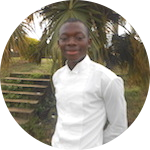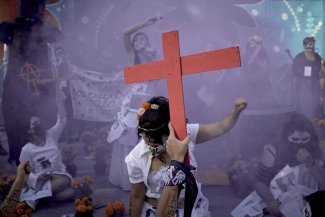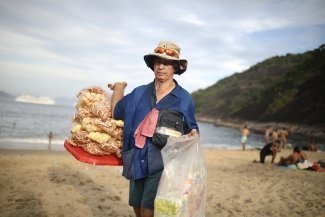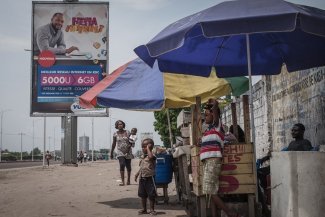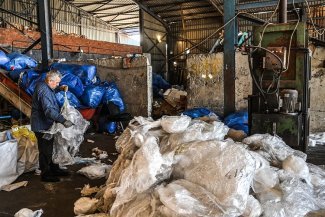A young man in Bamenda, a major city in one of two anglophone regions in Cameroon that have experienced protests and repression in recent months.
While football fans across the world revelled in Cameroon’s victory in the African Cup of Nations final on 5 February, the 20 per cent of Cameroonians who live in English-speaking part of the country had little to celebrate.
For over a month they have endured a total internet blackout which residents of the two affected anglophone minority regions consider a clear attempt by the government to stifle dissent following months of mass protests, strikes and disruption.
Although most Cameroonians also speak at least one of the country’s 240 local languages, French and English are the official languages, with French-speakers making up the majority of the population.
However, English speakers in north-west and south-west parts of the country make up approximately 20 per cent of Cameroon’s 23 million population.
Anglophones have long felt discriminated against by the francophone-dominated central government: they are massively underrepresented in key positions of power, and complain of being treated as second-class citizens in their own country, not to mention economic disenfranchisement.
Grievances came to a head in November 2016 after more than 100 people were arrested and as many as six people were killed following protests over the dominant use of French in anglophone courts and schools in the city of Bamenda in the Northwest Region. There were mass arrests, as well as serious allegations of police brutality, illegal detentions and torture.
Three prominent English speakers who were involved in the protests recently went on trial. Lawyer Nkongho Felix Agbor Balla and university lecturer Fontem Aforteka’a Neba – leaders of the Cameroon Anglophone Civil Society Consortium, which backs a return to the two-state federal system and was recently outlawed by the government along with the Southern Cameroons National Council, which supports secession – are facing multiple charges alongside protest leader Mancho Bibixy, such as insurrection, inciting hostilities against the state, terrorism, preaching secession and propagation of false information. They could face the death penalty if found guilty.
‘Internet refugees’
Meanwhile, millions of Cameroonians still remain cut off from the internet, a situation that David Kaye, the United Nations Special Rapporteur on freedom of expression, described as “an appalling violation of their right to freedom of expression” and a violation of international law.
In response, those living in the affected regions – particularly businesspeople and students – have come up with novel ways to circumvent the blackout. One measure has been the exodus of internet users to other parts of the country where there is still an internet connection, such as the capital city of Yaoundé, the commercial capital of Douala or the West Region capital of Bafoussam. Others are even heading to closeby towns in neighbouring Nigeria.
Experts in the Cameroonian tech hub in Buea – a city in the Southwest Region also known as Silicon Mountain – describe these people as ‘internet refugees’ or ‘digital refugees’.
“The internet blackout is unprecedented and unbearable,” Rolence Achia, a telecommunications systems engineering student at the University of Buea, tells Equal Times. Many banks are closed, ATM machines are not working, businesses have been forced to close and many workers have been forced to stay at home on unpaid leave.
A community manager, who asked to remain anonymous, says she now has to endure a dangerous commute just to get online. “I risk my life by travelling on the killer Kumba-Douala road [notorious for its road traffic accidents] once every week just to be able to go online. I am a refugee in my own country,” she complains.
Looking dejected, Neba Kitts, an English-speaking student in his late teens, arrives in Ekok, a small town on the Cameroonian border with Nigeria, from Bamenda. He says he is heading to Ikom in Nigeria, about an hour’s drive across the border, where he will be able to resume his online studies. “I do not intend to return to Cameroon until the internet is restored,” Kitts tells Equal Times before boarding a bus to Ikom.
Immigration officers in Ekok say that approximately 50 people, most of them youths, cross the border to Nigeria on a daily basis in search of an internet connection.
But despite the popular #BringBackOurInternet campaign, Cameroon’s government says it has blocked the internet to maintain social stability and will not restore it until the current civil unrest is over.
The ‘anglophone problem’
Cameroon’s so-called ‘anglophone problem’ dates back to the colonial era. Following the German annexation of what then became Kamerun in 1884, three decades later the territory was split between Britain and France after World War One. In 1961, a reunified Federal Republic of Cameroon was born but for 11 years the country operated under a two-state federal system. Since 1972, Cameroon has been run as a centralised unitary state, which English speakers say greatly favours the francophone majority.
One of the biggest issues is the use of French teachers in anglophone schools, and the encroachment of the French legal system on English speaking parts of the country. In October 2016, over 1000 lawyers went on strike over the appointment of French-educated magistrates who do not understand English common law, as well as the non-availability of legal texts in English.
In late November, they were joined by anglophone teachers who declared an indefinite strike. Many anglophone teachers’ trade unions – amongst them the Teachers’ Association of Cameroon and the Cameroon Teachers’ Trade Union – have been fighting against the creeping harmonisation of the country’s two autonomous education systems. It’s a move that anglophone teachers describe as a tacit attempt to asphyxiate English language education in Cameroon.
Asong Ndifor, an editor with Cameroon’s sole English language daily, The Guardian Post, describes the language problem as a “time bomb” that is just waiting to explode. But rather than defuse the bomb with diplomacy, the primary response of the government of President Paul Biya – who has himself been in power since 1982 – has been suppression.
Scores of anglophone protestors and activists have been arrested since October including Supreme Court judge and chairperson of the opposition Popular Action Party (PAP) Ayah Paul Abine, BBC correspondent Randy Joe Sa’ah, and The Guardian Post reporter Amos Fofung.
One of the lawyers representing Agbor Balla in his current high stakes trial told Deutsche Welle that the defendants were facing trumped-up charges. “You can see clearly that these are all hyper-political offences, which means you have no chance, none,” said lawyer Alice Nkomn.
Charles Achaleke Taku, a leading human rights barrister, originally from Cameroon, told Equal Times: “The bogus charges brought against Barrister Nkongho Felix Agbor Balla and others at the Military Tribunal in Yaoundé are a violation of international law. International law prohibits the court-martial of civilians.”
Meanwhile, human rights organisations such as Amnesty International, the African Bar Association, Reporters Without Borders and the Committee to Protect Journalists have all spoken out against the violation of human rights, suppression of freedom of the press and of expression as well as the unlawful arrests and detention by the government.
Towards a resolution
Amidst growing tensions, the government set up an Ad-hoc Inter-Ministerial Committee on 1 December to look into the grievances raised by teachers and to propose solutions to the wider crisis. So far, however, the efforts have proven futile.
Protests and boycotts continue every Monday and Tuesday in the anglophone regions; on 11 February – which marks the day of the plebiscite which saw the birth of the Federal Republic of Cameroon in 1961 – an expanded ‘ghost town’ boycott was observed but at least four people were killed in Ndop, just 45 kilometres from Bamenda, when clashes between civilians and the military erupted.
Prior to his arrest, Agbor Balla had been calling for a return to the 1961-1972 two-state federal system to resolve the crisis but President Biya came out strongly against the idea during his end-of-year address to the nation.
“Cameroon is one and indivisible,” Biya stated, noting that any attempts to alter the current form of Cameroon would not be tolerated, even though the 20 May 1972 referendum which created modern Cameroon is considered highly controversial.
Mobile users have received strongly worded messages from the Ministry of Post and Telecommunications warning them of this. “Dear subscriber. You will incur 6 months to 2 years imprisonment, and 5 to 10 million [US$ 8200 to US$ 16400] CFA in fines if you publish or spread on the social media, information that you can’t prove. MINPOSTEL,” reads one such message.
Mwalimu George Ngwane, a renowned civil society activist and conflict resolution specialist in Cameroon, told Equal Times that President Biya should order the immediate release of all those arrested and detained as a first step to resolving the current crisis.
Ngwane, who has advocated for the creation of the bilingualism commission that was recently set up by President Biya, also called for more mediation between the government, Anglophone leaders, traditional authorities and trade union leaders. “A national dialogue will serve the healing process,” he told Equal Times.



